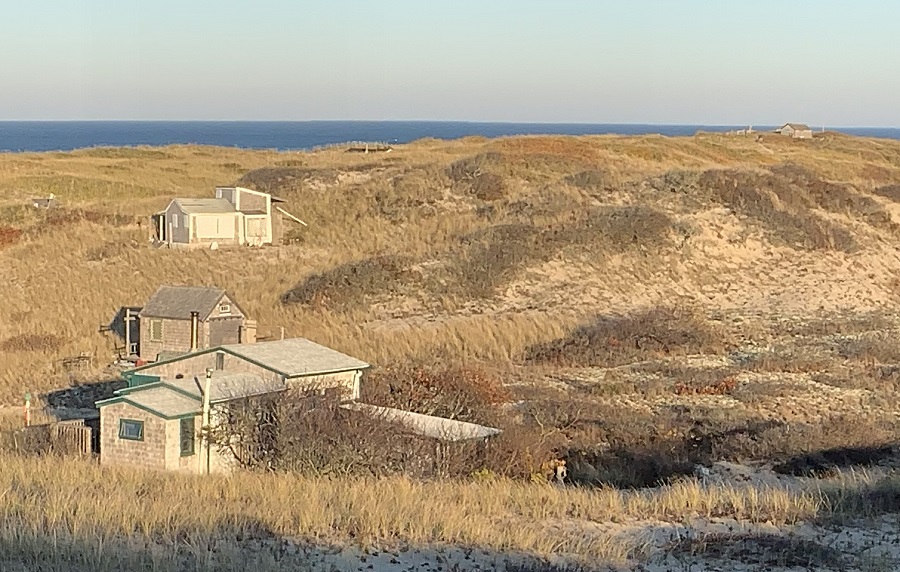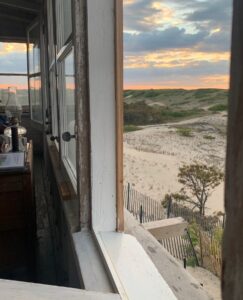PROVINCETOWN — The National Park Service has not responded to Provincetown and Truro, whose select boards have both asked for the suspension of the current request for proposals from bidders on 10-year leases for eight of the 18 dune shacks in the Peaked Hill Bars Historic District.
Both towns have said that the RFP does not align with the Dune Shack Historic District Preservation and Use Plan of 2012. The boards also requested a joint meeting with the Park Service and the Mass. Historical Commission.

The RFP has a July 3 deadline, at which point the agency is free to begin awarding leases.
The Mass. Historical Commission is one of two agencies that has official powers of inquiry regarding Park Service activities in National Historic Districts, which are regulated by the National Historic Preservation Act. Under that law, both the commission and the Advisory Council on Historic Preservation (ACHP) have formal roles to play.
The advisory council, an independent federal agency, can determine that “the terms of a programmatic agreement are not being carried out” — in which case the Park Service could not rely on that agreement to justify its actions and could have to begin an entirely new historic resource preservation plan from scratch.
The ACHP and the state historic preservation officer — in Massachusetts, that is Brona Simon, executive director of the state historical commission — each have the power to dispute whether Park Service actions have upheld their obligations under the law. When such a dispute is lodged, according to federal regulations, “All work that is the subject of the dispute will stop until the dispute is resolved in accordance with the procedures in this section.”
In other words, those agencies have the power to force the Park Service into a serious accounting of how its RFP is consistent with its written Preservation and Use Plan of 2012.
The current RFP differs from that plan in at least four areas: leasing selection criteria, seasonal use restrictions, the length of leases offered, and the ability for applicants to offer rent above market-rate prices.
Park Service officials have repeatedly told outside agencies that it is following the Preservation and Use Plan.
In February, for example, Sen. Ed Markey’s office was told that “the NPS is proud of the collaborative process that occurred during the Dune Shack Historic District Preservation and Use Plan Environmental Assessment (EA) Section 106 process.”
The plan “was developed with significant public and local government involvement,” the agency wrote, adding that “at this time CCNS is merely implementing the Plan/EA leasing plan.”
On May 1, however, the NPS released the current RFP, which contravenes that plan — and its assurances to Markey.
The ACHP can also issue an advisory opinion at any time “regarding the adequacy of the NPS’s compliance with Section 106.”
The Agencies Clam Up
Both Markey’s correspondence with the Park Service and a February advisory council meeting with National Seashore Supt. Brian Carlstrom took place at the urging of a constituent, Gail Cohen.

Cohen is not a dune dweller but says she has advocated on their behalf since 1989, when the shacks were determined to be eligible for the National Register of Historic Places. Cohen provided emails from Markey’s office and from the ACHP to the Independent that verify these interagency exchanges.
The agencies themselves, however, would not discuss them. Markey’s office, the ACHP, and Brona Simon of the Mass. Historical Commission all refused interview requests. The Park Service refused to permit an interview with Bill Burke, the National Seashore’s Section 106 coordinator.
Markey’s office referred written questions to a communications team, who would say only that “our office has been in touch with the National Park Service to elevate the community’s concerns.”
When pressed for details, the communications director added that “the Senator’s Office has asked NPS to respond to the concerns raised by Provincetown and Truro as soon as possible.”
The ACHP’s press department wrote that “the Programmatic Agreement specifies certain steps the NPS must take to fulfill its Section 106 responsibilities for the leasing program. We recommend you follow up directly with the NPS regarding questions about its actions.”
When asked about the consequences to the NPS for violating Section 106, ACHP lawyer Kelly Fanizzo wrote that “the possible consequences of noncompliance with Section 106, including noncompliance with an executed Section 106 agreement, are typically litigation (an entity suing the federal agency) or public attention / public pressure on agency management and leadership.”
The ACHP did not provide any information about its meeting with the Park Service in February.
The Mass. Historical Commission was even less forthcoming. At first, communications director Debra O’Malley would say only that “the Massachusetts Historical Commission does not have the authority to enforce Section 106.” She directed further inquiries to the ACHP.
When presented with follow-up questions, O’Malley directed the Independent to read the Code of Federal Regulations — and added that the agency was “declining to speculate on what may or may not trigger the sending of a letter of inquiry.”
Why So Coy?
Neither Gail Cohen nor Tom King, who was a director at the ACHP for a decade and helped coin the “traditional cultural places” concept that underlay Dr. Robert Wolfe’s ethnographic report on the dune dwellers in 2006, was surprised that the two agencies have hesitated to question the Park Service.

“There’s all kinds of things these agencies could do,” King said, speaking of the MHC and the ACHP. “They have the authority to ask questions and demand answers.”
The response of the ACHP so far is “typical,” King said. “They don’t want to have a fight with the Park Service. They don’t want to have a fight with anybody. So, they keep their head down and fob off anything like your inquiries back to the Park Service.”
According to the dispute resolution clause in the 2008 Nationwide Programmatic Agreement, a sufficiently strong objection from either agency could stop the RFP program from moving forward until its effects on the Dune Shacks Historic District have been resolved. That is exactly what the select boards of Provincetown and Truro have requested.
Neither agency would describe to the Independent what might trigger them to send a letter of inquiry to the Park Service, however — much less a formal dispute.
Supt. Carlstrom, in an email that arrived just before this week’s deadline, said that the letters from the Provincetown and Truro select boards do not, in themselves, constitute a dispute under Section 106.
“What bothers me is, they’re not responsive to we the people,” said Cohen. “They’re about to eliminate the last remnant of the real dune shack community, and these agencies are just covering themselves.”



